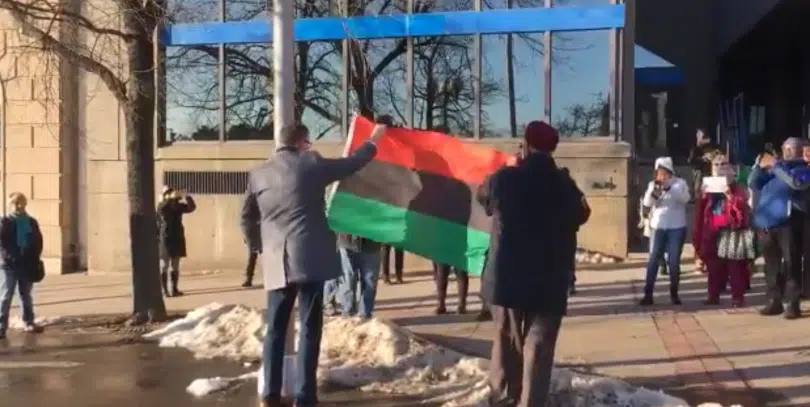The red, green and black Pan-African flag will fly in Saint John, Moncton, Fredericton, Miramichi, Riverview, Dieppe, Campbellton, and Quispamsis on February 1, to kickstart Black History Month.
Sankara Market, a social enterprise based in Saint John, is organizing the multi-city event alongside Black Lives Matter Fredericton, Black Lives Matter New Brunswick, New Brunswick Black History Society and Black in the Maritimes podcast.
The event, which will be streamed online at noon, is also supported by the New Brunswick African Association.
Sankara co-founder Lily Lynch says as a business, and one that serves as a platform to market multicultural goods and foods, it’s important to support such initiatives.
“Everyone’s identity and cultural heritage deserves to be celebrated and acknowledged publicly,” she said. “We are dedicated to creating experiences that are dedicated to a genuine understanding between cultures, and public commemorations like this is that, for sure.”
“Businesses and leaders in the business community play a big part because they are very integral to the fabric of our communities, and how we relate to one another, living in our communities and in their neighborhood,” she added.
This is the second pan-African flag-raising Sankara co-organized. The first one last year took place in Saint John with 70 people in attendance. This time, while people cannot gather in person, the eight flag raisings around the province will be streamed online.
“We hope to with this event bring around public dialogue around Black History Month, and in particular to the Black experience and encouraging people to do more anti-racism work and be thinking more inclusively, and of course, to reflect on the past and present contributions of Black Canadians and also Afro-descendant,” she said.
The red, black and green flag that will be raised symbolizes the freedom of Black people and represents people in the African diaspora and afro-descendant people around the world. The red signifies the bloodshed by those who died fighting for their freedom and the shared blood of African people, the black represented Black people, and the green is a symbol of Africa’s fertility.
Also known as the Black Liberation Flag, among other names, the flag was adopted by the Universal Negro Improvement Association (UNIA) at a New York City conference in 1920. UNIA’s leader Marcus Garvey had often talked about the need for a flag to symbolize Black liberation, and was famously quoted to say: “Show me the race or the nation without a flag, and I will show you a people without any pride.”
Representing the New Brunswick Black History Society, Ralph Thomas said Black History Month is a time for recognition and celebration. The 82-year-old has been fighting racism for decades. For him, being able to do raise a flag “in honour of our ancestors” two years in a row and with increased participation is encouraging.
“It’s a sign that people getting along. It’s a sign that we’re all thinking on the same level,” he said.
Lynch and Husoni Raymond, an organizer with Black Lives Matter Fredericton, are also encouraged and inspired by the increase in support and awareness, especially since the Black Lives Matter movement was re-sparked last summer.
Lynch, who is white, Black and Mi’kmaq, said she’s seeing people seek out more tools to educate themselves, though there’s much work left to be done.
“This year has been really something else in terms of awareness of issues that impact the Black community and impact the Indigenous, and Mi’kmaq community in particular,” she said
Lynch said the flag-raising is also a personal commemoration for her.
“Last year in January, I lost my grandfather, who was my biggest Black male role model. It was really challenging. And it still is challenging,” she said. “So I took that as a catalyst of what can I do to create more public commemorations.”
“Flag raising is super symbolic, so having this flag raised throughout the province and having all these leaders and individuals and community members support it is really powerful,” she said.
Raymond said Black history has often been erased and minimized in New Brunswick, so the province-wide event “would give more attention to the need to learn more about Black history and teach Black history in schools and also just about the black experience in general.”
Black Lives Matter Fredericton will highlight the stories of figures like Viola Desmond, an African-Nova Scotian who was arrested for fighting against segregation at a movie theatre and whose picture can be found on the $10 bill, and a woman named Nancy, a freed slave who took her master to court in Saint John in the 1800s, through a new Black history resource website for teachers that will launch Feb. 1.
“Hopefully that will lead to more conversations and more change,” he said. “Maybe sometime in the future, we can be hopeful that there will be no need for a Black History Month because Black history would be everyone’s history.”
Raymond says it’s important that businesses take part and support these initiatives because diversity and inclusion benefit businesses. But anti-racism also takes collaboration from the public and private sector, as well as citizens, he said.
“[Businesses] can play a role in fostering diversity and inclusion within their organization that culturally enriches these establishments,” he said. “It also gives them an advantage of diverse perspective and allows them to make decisions that are more innovative.”
Businesses can also support inclusion by ensuring their workplace is diverse and hiring minorities, Lynch said. They can take steps to ensure their staff “feel seen and heard and respected as whole people – all of themselves, including their racial and cultural identities, their religious affiliations and everything that’s part of being a person,” she added.
Inda Intiar is a reporter with Huddle, an Acadia Broadcasting content partner.





